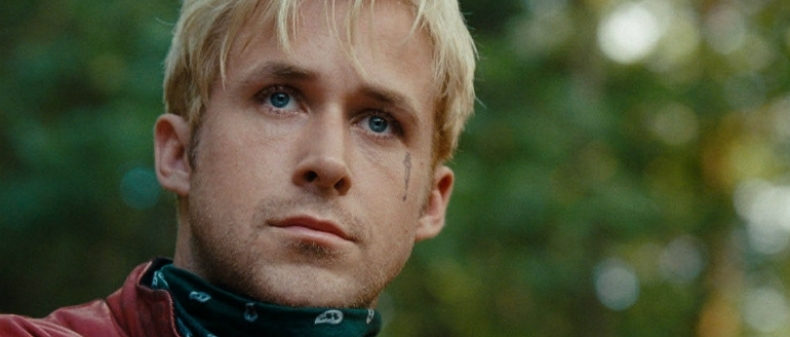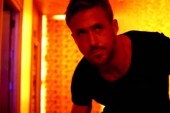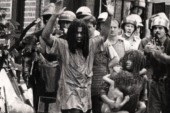
“The Place Beyond the Pines”
I love watching Ryan Gosling play tough guys, because he’s so adorably unbelievable as one. In The Place Beyond the Pines he’s a motorcycle stunt driver named Luke who wears sleeveless t-shirts, has tattoos all over his muscled bod, and flicks switchblades whenever he gets antsy. But he’s still pure Tiger Beat: you want to pinch him on the cheek and muss up his perfectly peroxided hair. It’s not just his matinee-idol looks that thwart him–it’s the mischievous curl of his mouth and his boyish let’s-play-make-believe performance style. Gosling has always struck me–sometimes for better, sometimes for worse–as a bit of a put-on artist. (As an Ontario boy, his real-life Noo Yawk accent is obviously put on, as he’s readily admitted.) It may be that he’s simply more comfortable with impersonation at the moment, that he isn’t yet able to suggest a real adult shaped by real experiences. The name Gosling is fitting: there’s something downy soft and still-unformed about him.
I don’t mean this entirely as a criticism. In fact, I think it’s a major factor in his appeal. As notions of masculinity continue to change and evolve, there’s something appropriate–touching, even–about Gosling’s inability to fully convince as a hard-living cop in Gangster Squad or as a strong-but-silent getaway driver in Drive. Because, of course, we don’t really believe in the macho swagger of Cagney and Bogart anymore, or in the macho-juvenile swagger of James Dean and the young Paul Newman, even if we still want to. We believe only in kidding all the old archetypes, and in deflating them. So when Gosling, in Place Beyond the Pines, sits on the edge of a wood gently revving his motorcycle, we don’t exactly mind that he doesn’t look truly macho or iconic, that he looks more like Disney woodland fauna. On some level, we like knowing he’s not that tough, that it’s all a pose.
The problem with The Place Beyond the Pines is that the whole movie is a pose, and director and co-writer Derek Cianfrance (Blue Valentine) doesn’t seem to know it. Gosling’s tough-but-sensitive hero is essentially the Johnny Depp character from Cry-Baby served up straight. (He even has a little dagger tattoo at the corner of one eye, like the tear drop Depp sported.) Luke wants to be good, see, but he was born to be bad. When he discovers via an old flame (Eva Mendes) that he’s a new poppa, he gives up stunt-riding to become a real father to his son. But being a father takes money, so he lets a sketchy mechanic friend (Ben Mendelsohn) convince him to rob banks. “It’s easy,” the friend says, explaining that Luke’s motorcycle skills will allow him to make lightning-fast getaways. From this point on, tragedy looms, and at one point the mechanic actually says to Luke, completely seriously, “If you ride like lightning, you’re gonna crash like thunder.”
That bit of dialogue is emblematic of the whole picture: every line is something you’ve heard before, and every scene mistakes cliché for mythic grandeur. Though we don’t know it at first, the movie is a multi-character, multi-generational saga, with Bradley Cooper taking over the middle section as an upstanding cop–he’s sort of the Javert to Luke’s Valjean–and Dane DeHaan and Emory Cohen taking over the final third as the two men’s troubled teenage offspring. The movie is meant to be an epic–a sprawling all-American saga of fathers and sons, sin and redemption, etc.–but there’s nothing fresh in it to hold your attention. It just comes across as three equally uninspired dramas stacked one on top of the other.
For the record, the middle section is a rather flaccid tale of police corruption, with Cooper playing a straight-laced, strangely dim-witted version of Frank Serpico. (Someone says to him at one point, “You’re too smart for your own good,” whereupon a wee bit of coffee shot out my nose.) And the final section–well, the less said about the final section the better. I just want to ask: whose idea was it to make the cop’s son–raised in an upper-class Schenectady household–grow up to be a rapping, wife-beater-wearing thug with an affected Long Island accent? And how are we supposed to take the movie even remotely seriously whenever he appears onscreen? On the other hand, he’s just the most ridiculous element in a movie that’s been at least faintly ridiculous from the get-go. Ambitious as it is, The Place Beyond the Pines is a huge miscalculation: dorky pulp that thinks it’s Greek tragedy.
“42”
The new Jackie Robinson biopic 42 is a thoroughly conventional Hollywood drama, but because Hollywood barely makes dramas anymore, let alone historical ones, I found myself enjoying it a tad more than expected. Writer-director Brian Helgeland (best known for the screenplays to L.A. Confidential and Mystic River) doesn’t do anything to freshen up the triumph-over-adversity formula, and as a director he’s workmanlike at best, but he does occasionally manage to convey something of what it must have been like for Robinson as the first man to break the colour barrier in baseball. There’s one especially fine scene in which Robinson (Chadwick Boseman), newly signed to the Brooklyn Dodgers, endures the dugout taunts of an opposing team’s manager (Alan Tudyk). What makes the scene differ from similar sequences in other movies is its rather daring length–it goes on and on, the word “nigger” deployed with numbing regularity, as if it were punctuation. After awhile, it gets to you the same way it gets to Robinson; it makes you appreciate the demoralizing power of invective.
In general, the best scenes in 42 are on the field, where Robinson’s trials play out non-verbally; off the field, the dramatic stakes become rather too explicit. As Dodgers general manager Branch Rickey, the man who drafted Robinson from the Negro Leagues, Harrison Ford chomps cigars and expounds on the significance of his star player’s every triumph, as if we could somehow fail to notice. (Ford gives a very broad performance, but not an un-charming one.) As Robinson, newcomer Boseman is solid, but he’s never permitted to become a full human being. It’s not that he’s given the saint treatment, exactly, but Rickey hits the nail on the head when he points out how Robinson has to be better than everyone else, both on the field and off, just to be accepted as equal. As in Django Unchained and countless other tales of black heroism, the hero’s supreme righteousness becomes a dramatic liability–makes him, regrettably, the least interesting person onscreen.
____
Scott MacDonald writes about cinema for Toronto Standard. You can follow him on Twitter at @scottpmac. He just started tweeting, so be gentle with him.
For more, follow us on Twitter @TorontoStandard and subscribe to our newsletter.














